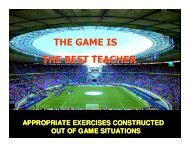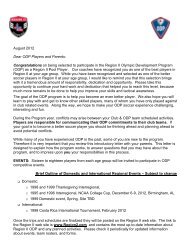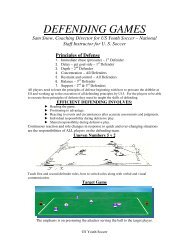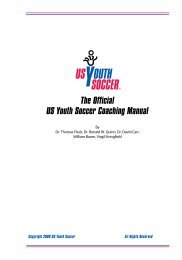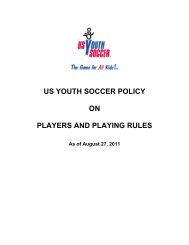Recreational Soccer Opportunities and Challenges
Recreational Soccer Opportunities and Challenges
Recreational Soccer Opportunities and Challenges
Create successful ePaper yourself
Turn your PDF publications into a flip-book with our unique Google optimized e-Paper software.
<strong>Recreational</strong> <strong>Soccer</strong><br />
<strong>Opportunities</strong> <strong>and</strong> <strong>Challenges</strong><br />
What are the <strong>Challenges</strong>?<br />
Here are some broad thoughts to consider, both challenges <strong>and</strong> attributes, for a state office<br />
<strong>and</strong> DOC/TD dealing with recreational soccer.<br />
Many young children start out in soccer. (It has been said that, “<strong>Soccer</strong> is the best<br />
beginning sport for children.”) <strong>Soccer</strong> is a game, especially at the very young level, where<br />
all skill-levels of children can participate <strong>and</strong> have fun.<br />
Many young children try many sports at a young age. Many young players (12 <strong>and</strong><br />
younger) are in many activities <strong>and</strong> may jump from one to another during the year or may<br />
be involved in multiple activities at the same time. (To a degree, this is a good thing.)<br />
Playing team sports helps to instill the importance of teamwork <strong>and</strong> working together that is<br />
vital in adult life.<br />
Almost every player <strong>and</strong> parent will start out in recreational soccer. Every year/season<br />
recreational soccer experiences an influx of first-time players, parents experiencing youth<br />
sports for the first time, <strong>and</strong> first-time, untrained, volunteer coaches. (What a challenge <strong>and</strong><br />
opportunity!) Virtually every recreational coach will be an unpaid parent volunteer. Most of<br />
your youngest age-group coaches will be first-time coaches, <strong>and</strong> many may have little or no<br />
soccer experience <strong>and</strong> no coaching experience.<br />
Each year there are new administrators with little or no experience or training taking charge<br />
of recreational soccer programs. Volunteers run recreational clubs, if not YMCA or Parks <strong>and</strong><br />
Recreation programs. Most of these volunteers may have no background in youth sports,<br />
education, or child development.<br />
What are the Risks?<br />
Many young kids drop out of all team sports because of an “initial bad experience.”<br />
Our youngest age-group players are many times taught by untrained, first-time coaches<br />
which is a contributing factor to that “initial bad experience.” Many times, the people taking<br />
care of the youngest age groups are the least experienced. According to a study by Martens,<br />
about half of youth sport coaches will drop out of coaching within a year.<br />
Many volunteer coaches are coaching their own children. Many times these children are<br />
“would-be stars” in the eyes of their parents. Equal treatment many not happen as a result.<br />
Pressure to meet expectations may be intense. Many of the volunteer coaches <strong>and</strong> their<br />
child will move to competitive if the opportunity is there. Losses of recreational coaches<br />
tend to occur when kids move to U10 <strong>and</strong> U12. As volunteers move with their kids to<br />
competitive soccer clubs, the recreational clubs lose many of their earlier energetic<br />
volunteer administrators <strong>and</strong> support.<br />
As a player progresses in age, the game becomes more complex. Many volunteer<br />
recreational coaches drop out <strong>and</strong> potential coaches who may not have coached in the past<br />
are hesitant to step forward because of this increased complexity.
Few recreational programs have a director of coaching. Those programs that do many times<br />
have a director of coaching who is not well-trained <strong>and</strong> grounded in training young players<br />
or new coaches.<br />
Many of the volunteer coaches <strong>and</strong> administrators in recreational soccer are based in <strong>and</strong><br />
use the professional model (The Power <strong>and</strong> Performance Model). The Power <strong>and</strong><br />
Performance Model or the Professional Model is prevalent in youth sports. One prime<br />
example is the Little League World Series.<br />
What Are the <strong>Opportunities</strong>?<br />
The first level of professionals in youth sports <strong>and</strong> coaching may be found in the state youth<br />
soccer office. The state office <strong>and</strong> State DOC/TD must be proactive in providing the<br />
assistance <strong>and</strong> guidance recreational soccer needs.<br />
The new volunteer coaches at the youngest age group are eager for guidance <strong>and</strong> training.<br />
Most of the new soccer parents in the youngest age group are very protective of their young<br />
children <strong>and</strong> are receptive to the concepts of the pleasure <strong>and</strong> participation model for this<br />
age group. (Unfortunately, this may be a brief window-of-opportunity until the power <strong>and</strong><br />
performance model begins to kick in!)


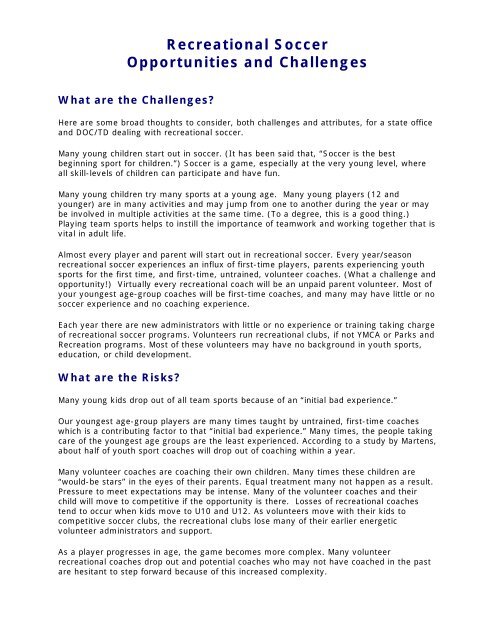



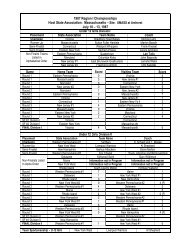



![Informational Letter attached to letter 8/28/2013 [PDF] - US Youth ...](https://img.yumpu.com/47952957/1/190x245/informational-letter-attached-to-letter-8-28-2013-pdf-us-youth-.jpg?quality=85)

